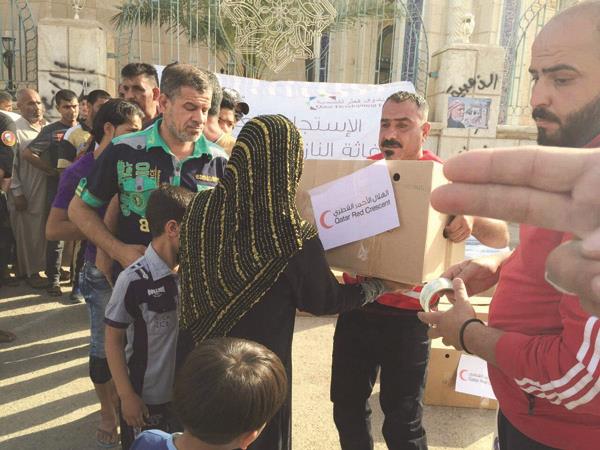
Qatar- QRCS completes aid supply in Iraq
DOHA: Qatar Red Crescent Society (QRCS) has completed the first phase of its emergency relief programme for the victims of armed conflict in Al Anbar Governorate, Iraq, with $1m funding from Qatar Development Fund.
Over the past three weeks, QRCS personnel in Iraq distributed 6,000 food packages to 36,000 internally displaced people (IDPs) in Fallujah, Al Anbar, and operated three mobile clinics to offer primary medical care for more than 80 IDPs. In relation to water and sanitation, two tankers are dispatched every day to provide 20,000 people with drinking water over six months, and awareness campaigns are launched to promote personal hygiene and prevent communicable diseases.
With lack of information, QRCS teams conducted needs assessments across Al-Anbar, particularly Fallujah, to collect data about the numbers of IDPs and their most urgent needs. Then, this data is shared with UN agencies and international humanitarian organizations.
In a statement, QRCS Secretary-General, Saleh bin Ali Al Mohannadi, said, “Humanitarian action in Iraq is facing alarmingly serious and complicated conditions in light of the political crisis and current conflicts.
However, we in QRCS are intensifying our efforts as an international neutral humanitarian organization, utilizing our track record of work in the world’s worst crises and zones”.
“Our strategy is to hire well-trained field relief personnel and adopt strict monitoring and follow-up systems to ensure non-exploitation of humanitarian aid for political or personal gain,” he added. One of the major crises in the world, the conflict in Iraq has stricken nearly one third of the country’s population, causing 10 million to be displaced, 3.4 million of whom within the past 30 months only. About 20 percent of IDPs live in unregistered or substandard places, including unfinished structures, schools, public parks, and mosques. The local community is hosting 30 percent of the displaced families, half of whom need better housing.
In Al Anbar, which has received as much as 44.3 percent of IDPs, many families fled the beleaguered Fallujah to be accommodated at only 13 camps in Amiriyah Fallujah, Khalidiya, and Habbaniyah. Clashes in the western parts of Ramadi, the provincial capital, rendered more than 12,000 families of Hit City homeless, having to travel about 5km to 18km to find an IDP camp.The Peninsula

Legal Disclaimer:
MENAFN provides the
information “as is” without warranty of any kind. We do not accept
any responsibility or liability for the accuracy, content, images,
videos, licenses, completeness, legality, or reliability of the information
contained in this article. If you have any complaints or copyright
issues related to this article, kindly contact the provider above.


















Comments
No comment